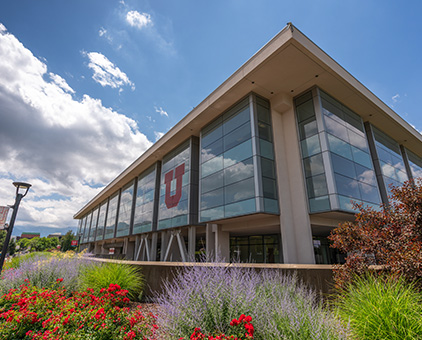Communication
Capstones
Program
769
Declared
Majors
29
Average
Class Size
Courses
Getting Started
- Satisfy Gen Ed requirements by taking COMM courses related to public speaking, argumentation, media studies, and media/news writing
- Take the first year seminar course to explore the emphases and discover resources
Making Progress
- Begin taking upper-division courses to engage in more targeted concepts and skill development
- Meet with advisors to stay on track
- Use degree planning tools like My Degree Audit
- Take courses to gain skills that will be valuable for future internships
Finishing Up
- Put advanced skills into practice in a Capstone Course wherein you'll complete projects and portfolios
- Actively track progress and meet with advisors as you approach graduation
Community
Getting Started
- Connect with other students and learn in COMM communities like the John R. Park Debate Society, Dialoguing Across Differences, PRSSA, and Student Media
- Develop relationships with mentors by actively participating in the classroom and attending office hours
Making Progress
Pursue leadership opportunities and partake in community practices relevant to COMM:
- Compete in debate competitions
- Create PR campaigns
- Publish compelling news articles
- Consider getting involved in student government, peer advising, the Humanities House, Bennion Community Service Center, and clubs/organizations
Finishing Up
- Spearhead (or volunteer for) a project that benefits the broader community
- Deepen your community engagement by considering opportunities abroad, internships, and professional development such as CPDC events/conferences
Knowledge & Skills
Getting Started
Explore the broad field of COMM through intro courses:- Health Communication
- Environmental Communication
- Public Relations
- Media/News Writing
- Human Communication Theory
Making Progress
- Take skill-, application-, and research-based courses in your area
- Gain practical experience by participating in internships and research projects
- Develop proficiencies by taking courses in web design, photography, video production, editing, public speaking, debate, and data analysis
Finishing Up
- Demonstrate competencies in capstone courses required in your chosen area of study
- Finalize projects and portfolios to help illustrate your educational experience
- Highlight transferable skills acquired from internships
Transformation
Getting Started
- Plan courses and extracurricular activities to meet your personal and professional goals
- Round out your education by taking Gen Ed courses in other disciplines
- Explore clubs and organizations at Weeks of Welcome
Making Progress
- Gain self-efficacy through leadership experiences, service, and practical application
- Plan campus events like a diversity forum or guest speaker panel
- Embark on a learning abroad experience relevant to your area of study
- Make a documentary
- Seek an internship at a public relations firm or news station
Finishing Up
- Articulate the knowledge you gained through an internship, practicum, or senior capstone
- Develop your personal brand as you search for jobs and apply to grad school
Impact
Getting Started
Step outside your comfort zone and experience communities different from your own:
- Participate in an Alternative Fall/Spring Break
- Take a CEL course during your first year
Making Progress
- Find your passion by trying COMM courses related to gender, race, social justice, public health, ethics, climate change, politics, and science communication
- Seek leadership opportunities in campus or non-profit organizations
Finishing Up
- Publish a paper
- Present your work to a larger audience
Careers
Getting Started
- Develop a professional identity by exploring your strengths
- Attend a career fair
- Find a campus job
- Meet with a Career Coach or Advisor to get started early
Making Progress
Take advantage of a variety of tools and resources:- Create a Handshake account and a LinkedIn profile
- Visit the Career Studio to begin working on resumes, cover letters, and interview practice
- Conduct an informational interview with faculty, employers, or alumni
- Take career courses geared toward professional development
Finishing Up
Get ready to find a job or apply to grad school:- Polish your resume
- Build confidence in articulating your skills
- Seek letters of recommendation
- Practice interview skills
Start Your Career Journey
Find support at the Career and Professional Development Center (CPDC)
About the Major
Learning Outcomes
- Gain the skills you need to communicate effectively across written, oral, visual, digital, and mobile media.
- Understand the structure and reasoning of argumentation and learn to present arguments in written and spoken form.
- Recognize and ethically engage in issues of difference and identity (e.g.gender, race, ethnicity, nationality, sexuality, ability, and age).
- Explore the social, historical, legal, environmental, and economic contexts related to your area of study.
Plan & Prepare
At the U, we plan for our students to have an exceptional Educational Experience identified by four broad categories we call the Learning Framework: Community, Knowledge & Skills, Transformation, and Impact. This major map will help you envision, explore, design, and plan your personalized Exceptional Education Experience with the Learning Framework at the core. In addition to assisting you in planning your coursework and navigating the requirements of your major, this map will help you incorporate other kinds of experiences to expand your knowledge, support your development, and prepare you for the future you want.


